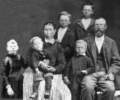| Home
Society Rejects the Creature
The Creature Rejects Society
Sources
Photo Page
|
|
|
Rejection Received
Over the course of the novel Frankenstein, the unnamed creation of Victor Frankenstein, referred to as the monster, receives rejection from individuals as well as groups of people. Rejection, only one of the negative feelings consuming the monster's life, has a major impact on how he views himself. By the end of his life, he sadly believes, "I, the miserable and the abandoned, am an abortion, to be spurned at, and kicked, and trampled on" (Shelley 1033).
|
|
|
Victor Frankenstein
The initial rejecter, Frankenstein, is the first to show the monster the meaning of rejection. Upon the creation of life, Frankenstein looks at the "wretch" he has made and immediately denies it. He flees to his room at the realization of what two years of hard work had accomplished. He describes his creation as demonical corpse. When the monster tries to approach him and speak to him, Frankenstein flees to take refuge elsewhere, in order to avoid his creation (Shelley 935). Why this rejection? Frankenstein so horrified by the monster's outward appearance that he judges his whole character on what he sees.
Though the Frankenstein's creation immediately uses his five senses, it takes a long while for him to understand them. His experiences inspire numerous feelings, including a longing for the love and acceptance of a female companion. The monster eventually learns the ways of man: speaking, reading, learning, etc. After discovering who his creator is and how he was made, the monster seeks out Frankenstein to demand from him the wife he owes him to destroy his loneliness. After hearing the tale of the monster's life, Frankenstein consents to create a female partner, persuaded by the fact that upon filling this request the monster and his wife will flee to an uninhabited area in South America, permanently away from humans. However, the monster's high hopes and expectations are literally torn to pieces when Frankenstein abandons his work of producing a second being (Shelley 961-989, 1000-1001). He breaks his promise to the monster and deprives him of ever having the fulfillment of a female companion. Once again the monster, his feelings, and his desires are rejected by his creator.
|
|
|
Townspeople
Having unusual, scary, wretched looks, the monster receives rejection by the masses. While wandering from his place of creation, he comes upon a village. Enticed by the vegetables and dairy products, he attempts to enter on of the cottages. As the monster tells Frankenstein, "...but I hardly placed my foot within the door, before the children shrieked, and one of the women fainted. The whole village was roused; some fled, some attacked me, until, grievously bruised by stones and many other kinds of missile weapons, I escaped to the open country, and fearfully took refuge in a love hovel..." (Shelley 964). The townspeople reject and make an outcast out of the monster by their reaction to his presence. His experience with the villagers is never forgotten; it changes the way he views humans and the way he views himself. He is fearful to approach the De Lacey family, or to venture out during daylight because of the cruel, judgmental treatment he received from the villagers (Shelley 966, 971).
|
 |
The De Lacey Family
The De Lacey family inhabited the cottage adjacent to the hovel the monster took shelter in. It was through observing them that he learned the ways of mankind: how to think, speak, read, learn, act and love. After a long period of time, the monster mustered the courage approach the old, blind De Lacey man. His efforts were diminished by the violent blows Felix gave him with a stick upon seeing the monster at the knees of his father. His outward appearance caused him to be rejected by the family he admired, learned from, and even performed labors such as supplying fire wood and clearing the path of snow for them (Shelley 964-981).
|
|
|


